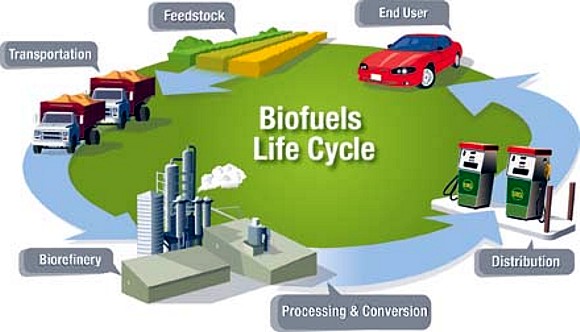New York and North Carolina Farmers Joining The U.S. Biomass Crop Assistance Program
 July 31, 2012
July 31, 2012  Kyriaki (Sandy) Venetis
Kyriaki (Sandy) Venetis New York and North Carolina are the two newest states to join America’s growing biofuel industry. The U.S. Department of Agriculture has authorized an investment of $9.6 million that will be distributed for the creation of the two new projects and the expansion of the already existing project in Arkansas.
 Graphic courtesy of Environment, Health, and Safety News.
Graphic courtesy of Environment, Health, and Safety News.
New York and North Carolina are joining 10 other states – Arkansas, California, Kansas, Missouri, Montana, Ohio, Oklahoma, Oregon, Pennsylvania, and Washington – in the Biomass Crop Assistance Program (BCAP), whose purpose is to expand the nation’s non-food grade energy crops to be used in manufacturing liquid biofuels.
The energy crops being grown, such as giant miscanthus, switch grass, and shrub willow, are the “first ever national investments in expanding U.S. biomass resources to meet domestic energy needs,” said the USDA, which adds that the current “total investment in those projects is estimated to be $55 million.”
In Upstate New York, the BCAP project is ramping up efforts to meet the state’s goal of sourcing 24 percent of power generation by 2013. ReEnergy Holdings LLC is operating the project and is looking to cultivate up to 3,500 acres of fast growing shrub willow in an effort to generate about 100 megawatts of electricity.
ReEnergy has three facilities dedicated to purchasing from growers in the project area, which is expected by to create about 150 jobs – direct and indirect – partly through outreach to the region’s “Come Farm With Us” campaign, which is directed toward new and beginning farmers, and the nearby St. Regis Mohawk reservation.
In North Carolina, the BCAP project will be operated by Chemtex International Inc., which plans to grow about 4,000 acres of Freedom giant miscanthus and switch grass.
The crop production will support the company’s Project Alpha cellulosic biorefinery, which is expected to produce an annual 20 million gallons of bioethanol, as well as develop other future sustainable chemicals, and onsite biogas for power generation. The biorefinery expects to create about 65 direct jobs and 250 indirect jobs.
The North Carolina propagation, planting, mitigation, and monitoring of the crops will be coordinated by REPREVE Renewable LLC, which is also the sponsor of the project’s accompanying environmental assessment.
In northeast Arkansas, the BCAP project will expand its cultivating area to nearly 8,000 acres of giant miscanthus. The project will be operated by MFA Oil Biomass LLC and its partner, Aloterra Energy. They will coordinate the crop propagations, planting, mitigation, and monitoring plan.
The Arkansas crops will support the expected production of fuel pellets for export, in-farm heating, and biobased packaging. This project is expected to create about 750 direct and indirect new jobs.
MFA Oil Biomass LLC and Aloterra Energy also operate BCAP projects in Missouri, Ohio, and Pennsylvania, and have invested more than $6 million in the operations.
The deadline for signing up for the New York, North Carolina, and Arkansas projects is Friday, Sept. 14, 2012. Farmers interested in participating in the projects need to visit their local Farm Service Agency county offices.
Participating farmers will be eligible for reimbursement of up to 75 percent of the establishment costs of perennial energy crops, as well as up to five years of annual maintenance payments for herbaceous crops, and up to 11 years for woody crops.
Assistance for the collection, harvest, storage, and transportation of the crops to refining facilities will be available for two years, per farmer, in the form of matching payments of up to $45 per ton of the delivery costs.
The BCAP is the primary component of the U.S. strategy to reduce reliance on foreign oil, improve domestic energy security, reduce carbon pollution, and spur rural economic development and job creation.
Also a motivator in the projects is that the federal Renewable Fuels Standard (RFS) is requiring that 21 billion gallons of non-cornstarch biofuels in the national fuel supply by 2022 and new types of biomass feedstocks are needed to meet this requirement.
Reader comments and input are always welcomed!

Reader Comments